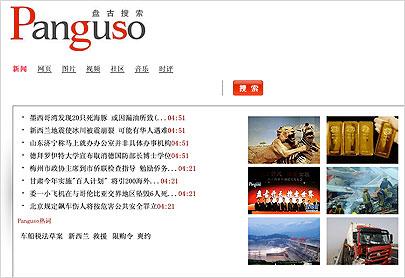China: A commie Google?
A screen grab of China’s new search engine Panguso
China has long had an uneasy relationship with the internet, from porn to political protest.
The heart of this digitial dilemma is simple: how can central authorities use the power of the web to boost economic growth and efficiency, while maintaining some degree of control over it?
The debate is not trivial.
China has 457 million internet users (and 303 million mobile web users), more than any other country. Beijing employs an internet police force of some 30,000 people that monitors content and routinely blocks sites that mention Falun Gong, Tiananmen Square, the Dalai Lama and other sensitive topics. Last July, even Google gave up and pulled out of China amid censorship worries.
But the story continues, and this week we learned about the latest entry into this long-running web drama: Panguso.
Named after Pangu, the creator of the universe according to Chinese mythology, Panguso is a new search engine launched by China's state-run news agency Xinhua and China Mobile.
The partnership aims to fuse Xinhua's expertise with news and information, with China Mobile's growing base of mobile phone users in China.
Like anything it China, this won't be easy. Panguso faces strong competition from local search engine Baidu, which claims a better than 75 percent market share of China's growing search industry.
The timing of the move, too, is raising some eyebrows. The government-controlled Panguso arrives amid new calls for Egypt-style protests in China.
Yes, we live in interesting times.
Every day, reporters and producers at The World are hard at work bringing you human-centered news from across the globe. But we can’t do it without you. We need your support to ensure we can continue this work for another year.
Make a gift today, and you’ll help us unlock a matching gift of $67,000!
